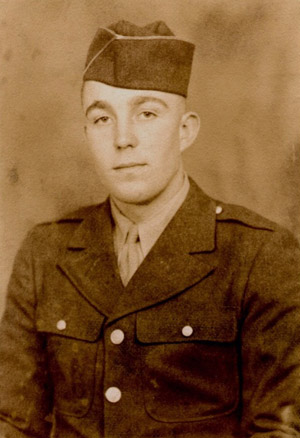
Courtesy Marmell O'Brien, half-sister

Remember...
Leon Shelburn Paxton
1923-1944
"We owe our World War II veterans:and all our veterans:a debt we can never fully repay."
Doc Hastings
 Courtesy Marmell O'Brien, half-sister |
Remember...Leon Shelburn Paxton
|
Leon Shelburn Paxton was born on May 20, 1923, at Dundon, in Clay County, West Virginia. His father was Alonzo Shelburn Paxton, and his mother was Nancy Paxton. Leon had four siblings: Jesse, Robert, Maysel, and Virginia.
According to Leon's family, he had grown into "a fine young man." He was lively, light-hearted, and liked by everyone. After receiving two years of high school education, Leon dropped out. Finally, Leon enlisted in the U.S. Army on December 1, 1942, in the midst of the World War when he was only 19 years old. Following boot camp, Leon was able to return home only once while he was in the army. During the time he was home, he told his uncle, Howard Paxton, that he would never come home again, and his apprehension was eventually proven right.
The area in which Leon Paxton grew up was a rural area in a very isolated portion of Clay County. The population of Clay County was at its highest in the 1940s, with 15,206 residents. In 1920, its population was 11,486 residents and that increased to 13,125 residents in 1930. The county was major site for coal mining and timber, and there were also railroads that travelled through the area. One of the railroads went straight through Paxton's birthplace of Dundon. Coal and timber were the primary resources carried by the railroads. In Dundon, there was also a train shop. A neighboring town, Cressmont, had a successful dairy. Enoch, which is where Paxton moved at a young age, had a post office. Schools in Clay County at the time included the Oak Hill School, which was an elementary school, and Clay County High School. (Sources consulted for Clay County history: Hickory and Lady Slippers [series]: Vol. IX, Life and Legends of Clay County People: Rambling Through the Wilderness; Vol. IV, Bk. 2, Widen: An Appalachian Empire[Clay, WV: Clay County High School, 1986, 1979]; "Clay County Towns & Places," accessed 3 March 2016, http://www.wvgenweb.org/clay/cltp.htm.)
At the beginning of World War II, the United States was hesitant to get involved because of the Depression that had occurred after World War I ended. However, once the United States joined the war, it began producing materials to help with the war effort. West Virginia's slogan was "Mountaineers ever free," which eventually progressed into West Virginians rising to the occasion for the war. West Virginia factories became large producers of materials and supplies for the war. The Kanawha Valley, especially, provided for a lot of the state's war contribution. The state had an abundant source of natural resources, like lumber, and also provided other materials, such as naval vessels and food. Beef cattle were produced on farms across the state, and apple growing became popular on farms, and the apples were primarily supplied to the Allies in Europe. West Virginia also made major contributions by improving its modes of transportation, especially the road system. By making this improvement, West Virginia was able to be more efficient in distributing supplies due to the more easily accessible highways that were created . (Source: West Virginia State Archives, "From Every Mountainside [early 1942 film made by the West Virginia State Road Commission to show West Virginia's part in the war effort]," 31 July 2015, accessed 8 June 2016, https://www.youtube.com.)
Technician Fifth Class Leon Paxton was assigned to F Company, 1st Ranger Battalion, 75th Ranger Regiment. The men in the 1st Ranger Battalion were among the first American soldiers to face combat. In F Company, Leon became a rifleman.
T/5 Leon Paxton's unit was in the European Theater of Operation when it became engaged in the Anzio Beachhead landing in 1944, and from there they participated in the Battle of Cisterna in Italy. The 1st and 3rd Ranger Battalions, composed of 767 men, went out under cover during the night of January 29 into the atrocious battle and only six returned. Leon Paxton was killed in action during this battle on January 30, 1944. He was the runner for Lieutenant James G. Fowler, the courageous leader of the point platoon. The soldiers were cut down by German machine guns; almost all the bodies were not recovered, including Leon's. As a result, he is listed on the Tablets of the Missing at the Sicily-Rome American Cemetery in Nettuno, Italy, close to where he had died.
At the time of Leon Paxton's death, a lot was going on around the world concerning the war. On January 22, troops from the Fifth Army had swarmed an Italian beach near Anzio. It was a swift quick breach that moved the troops nearly four miles inward by nightfall. On January 27, Soviet leader Joseph Stalin declared the siege of Leningrad over and re-opened the Moscow-Leningrad railway route which played in favor of the Soviets. Six German divisions were moved to Anzio on January 28. On the same day, Hitler demanded Italy's commander-in-chief to drive the Allied forces back into the sea. By January 30, the Allies had suffered around 5,000 casualties in Anzio. By February 10, all Allied gains had been lost. On June 4, after many casualties and struggles, the Americans liberated the Italian capital of Rome. By May of 1944 Cisterna was finally in Allied hands.
Family information and portions of the military history provided by Ronnie Hamrick, cousin of Leon Shelburn Paxton
Prepared by Yuxin Ren, Addison Swackhammer, and Ryan Moye, George Washington High School, Advanced Placement U.S. History
May 2016

West Virginia Archives and History welcomes any additional information that can be provided about these veterans, including photographs, family names, letters and other relevant personal history.